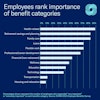 Katie Mahoney
Katie Mahoney
Former Vice President, Health Policy, U.S. Chamber of Commerce
Published
December 02, 2022
Fill Me In: Employer-based health coverage is the backbone of the American health care system, and employees report health-related benefits are yet again the most important benefit employers have to offer, according to a recent survey by the Society for Human Resource Management (SHRM).
The survey found that 88% of employers ranked health-related benefits as “very important” or “extremely important,” prioritizing it above retirement savings, leave, family care, education, and transportation benefits.

Yes, and: Employers and their workforce alike continue to place a high value on employer-sponsored coverage and are favoring recently increased telehealth and mental health benefit offerings.
The pandemic has reshaped specific employer benefit offerings with SHRM reporting that 93% of surveyed organizations now offer telemedicine or telehealth services as part of their healthcare coverage – an increase of 20 percentage points as compared to 2019. Similarly, 91% of employers now offer mental health coverage, a new record from years prior. The findings underscore how the employer system continues to innovate to meet the needs of workers and their families.
The Value to Business: While the SHRM survey highlights the trends in employer-benefit offerings and what U.S. employees value most, there is data to demonstrate the value to business as well. A recent study by Avalere Health revealed a significant return on investment for businesses offering employer-sponsored insurance (ESI).
Further, the study found that on average, employers with 100 or more workers who provide notable health benefits see a positive ROI of 47%. Avalere attributes this ROI to factors like higher worker productivity, lower direct medical costs, and reduced spending on recruitment and retention. And this number is expected to rise to 52% by 2026.
Bottom Line: ESI consistently ranks as the most valuable and desired benefit for both employers and employees, and recent surveys make clear that this trend is not changing.
Even in the most challenging times, health-related benefits provide the American workforce financial security and peace of mind. Now, as Americans adjust to the “new normal” of a post-pandemic world, it’s evident employers and employees will continue to prioritize these innovative health benefits for years to come.
About the author

Katie Mahoney
Katie W. Mahoney is the former vice president of health policy at the U.S. Chamber of Commerce.





